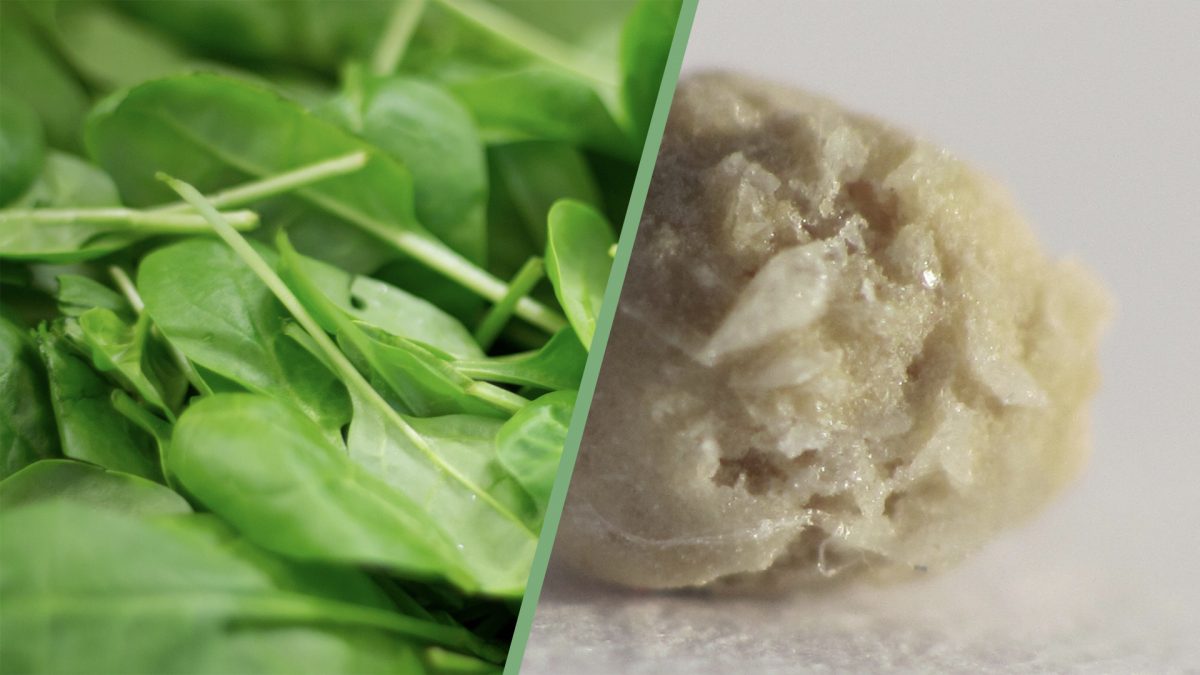
Spinach
Topic summary contributed by volunteer(s): Randy
Spinach is a great way to add variety in a healthy plant-based diet (see also here, here). It appears to be protective in vitro against breast cancer, brain tumor, kidney cancer, lung cancer, pediatric brain tumor, stomach cancer, pancreatic cancer, and prostate cancer cells, due perhaps in part to its chlorophyll content, which may protect DNA against mutations.
Spinach is a great source of folate, which may be preferable to folic acid supplements (though the latter should probably still be taken in early pregnancy). Higher dietary intake of foods containing folate may contribute to improved mental health and lower risks of depression and anxiety disorders. A single spoonful of spinach also has as much lutein and zeaxanthin as nine eggs (see also here). A third cup a day is recommended for optimal eye protection against age-related macular degeneration and other premature degenerative diseases. Spinach is also a good source of antioxidants. It also provides nitrates, which can in certain circumstances improve arterial function, athletic performance and even the appearance of wrinkles.
For substantiation of any statements of fact from the peer-reviewed medical literature, please see the associated videos below.
Image Credit: Daniella Segura / Flickr. This image has been modified.
Popular Videos for Spinach


Oxalates in Spinach and Kidney Stones: Should We Be Concerned?
Even though dietary oxalates may have a limited effect on kidney stone risk in most...
Foods to Improve Athletic Performance and Recovery
What are the effects of spinach and berries on oxidative stress, inflammation, and muscle soreness...All Videos for Spinach
-

Can Goitrogens in Soy and Cruciferous Vegetables Interfere with Thyroid Function?
What is the controversy over soy food consumption in those with subclinical hypothyroidism?
-

The Best Way to Cook Vegetables
Which method of cooking vegetables preserves the most antioxidants?
-

Food Poisoning: Causes and Prevention
Why do contaminated poultry products cause the most foodborne deaths?
-

Nitrates in Food to Help Fight Respiratory Tract Infections
Perhaps it’s no coincidence that an infusion of spinach leaves has evidently been used since ancient times to treat respiratory symptoms.
-

The Best Foods for Your Skin
Greens, apples, tomato paste, and grapes are put to the test as edible skin care candidates.
-

Using Prebiotics, Intact Grains, Thylakoids, and Greens to Boost Our GLP-1 for Weight Loss
Boost our natural satiety hormone GLP-1 through out diet.
-

How to Get Rid of Garlic Breath
After study participants took some garlic, researchers gave them whey protein, lemon juice, green tea, chlorophyll, 7UP soda, a raw pink lady apple, a cooked apple, parsley, spinach, and mint leaves. Which do you think worked best?
-

How to Boost Collagen Synthesis with Diet
Which foods can increase collagen deposition and prevent wrinkles?
-

How to Treat Body Odor with Diet
Deodorize from the inside out with food.
-

The Fat-Blocking and Appetite-Suppressing Effects of Thylakoids
What is a natural way to cut down on unhealthy food cravings?
-

Do Vegans Have Lower Bone Density and More Fractures?
What are the bone fracture rates of omnivores vs. vegetarians vs. vegans?
-

The Benefits of Moringa: Is It the Most Nutritious Food?
Does the so-called miracle tree live up to the hype?
-

Evidence-Based Weight Loss – Live Presentation
In this live presentation, Dr. Greger offers a sneak peek into his book How Not to Diet.
-

For Flavonoid Benefits, Don’t Peel Apples
Peeled apples are pitted head-to-head against unpeeled apples and spinach in a test of artery function.
-

Does Pressure Cooking Preserve Nutrients?
How Dr. Greger pressure steams his greens.
-

Kidney Stones and Spinach, Chard, and Beet Greens: Don’t Eat Too Much
Given their oxalate content, how much is too much spinach, chard, beet greens, chaga mushroom powder, almonds, cashews, star fruit, and instant tea?
-

Oxalates in Spinach and Kidney Stones: Should We Be Concerned?
Even though dietary oxalates may have a limited effect on kidney stone risk in most people, there are some predisposing factors that can put anyone at risk.
-

How to Prevent Toxoplasmosis
The risk of contracting the brain parasite toxoplasma from kitty litter vs. meat.
-

Best Way to Cook Vegetables
Boiling, steaming, microwaving, air frying, and sous vide cooking are put to the test for nutrient retention.
-

Do Lutein Supplements Help with Brain Function?
Avocados, greens, and lutein and zeaxanthin supplements are put to the test for improving cognitive function.
-

Brain-Healthy Foods to Fight Aging
What is the best source of lutein, the primary carotenoid antioxidant in the brain?
-

Best Brain Foods: Greens and Beets Put to the Test
Cocoa and nitrite-rich vegetables, such as green leafies and beets, are put to the test for cognitive function.
-

Best Brain Foods: Berries and Nuts Put to the Test
Randomized controlled studies put nuts, berries, and grape juice to the test for cognitive function.
-

Ground Ginger to Reduce Muscle Pain
There have been at least eight randomized, double-blind, placebo-controlled trials of ginger for pain.
-

Foods to Improve Athletic Performance and Recovery
What are the effects of spinach and berries on oxidative stress, inflammation, and muscle soreness in athletes?
-

Dr. Greger’s Daily Dozen Checklist
In my book How Not to Die, I center my recommendations around a Daily Dozen checklist of everything I try to fit into my daily routine.
-

Dr. Greger in the Kitchen: My New Favorite Beverage
Dr. Greger blends up a vegetable smoothie inspired by a recipe in his How Not to Die Cookbook.
-

Dr. Greger’s Daily Dozen Checklist
In my book How Not to Die, I center my recommendations around a Daily Dozen checklist of all the things I try to fit into my daily routine.
-

Can Vitamin C Help with Lead Poisoning?
Those who have higher vitamin C levels tend to have less lead in their bloodstream, but what happens when people are given vitamin C supplements to put it to the test?
-

Lowering Our Sodium-to-Potassium Ratio to Reduce Stroke Risk
The potassium content in greens is one of two ways they can improve artery function within minutes of consumption.
-

Benefits of Marjoram for Polycystic Ovary Syndrome (PCOS)
Even a small amount of fresh herbs can double or even quadruple the antioxidant power of a meal. The abilities of oregano to decrease chromosomal damage from radiation and marjoram to affect hormone levels in women with PCOS are put to the test.
-

Slowing Our Metabolism with Nitrate-Rich Vegetables
The reason greens are associated with a significantly longer lifespan may be because, like caloric restriction, they improve our energy efficiency.
-

Fennel Seeds to Improve Athletic Performance
What are the pros and cons of fennel fruits as a cheap, easy-to-find, light-weight, nonperishable source of nitrates?
-

Using the Produce Aisle to Boost Immune Function
Vegetables tested head-to-head to see which boosts immune function best.
-

Industry Response to Plants Not Pills
The whole food is greater than the sum of its parts: how unscrupulous marketers use evidence that ties high blood levels of phytonutrients with superior health to sell dietary supplements that may do more harm than good.
-

Are Green Smoothies Good for You?
Smoothies (and blended soups and sauces) offer a convenient way to boost both the quantity and quality of fruit and vegetable intake by reducing food particle size to help maximize nutrient absorption.
-

Treating Dry Eye Disease with Diet: Just Add Water?
Causes of dry eye disease include LASIK laser eye surgery, but there are dietary approaches to prevention and treatment.
-

Antioxidants and Depression
Neither antioxidant or folic acid supplements seem to help with mood, but the consumption of antioxidant-rich fruits and vegetables and folate-rich beans and greens may lower the risk for depression.
-

Does Cholesterol Size Matter?
How do American Egg Board arguments hold up to scientific scrutiny, such as the concept that large fluffy LDL cholesterol is protective compared to small, dense LDL?
-

Which Vegetable Binds Bile Best?
Which foods are best at removing carcinogenic bile acids from the body: asparagus, beets, broccoli, cabbage, carrots, cauliflower, collards, eggplant, green beans, kale, mustard greens, okra, or peppers? And do they work better raw or cooked?
